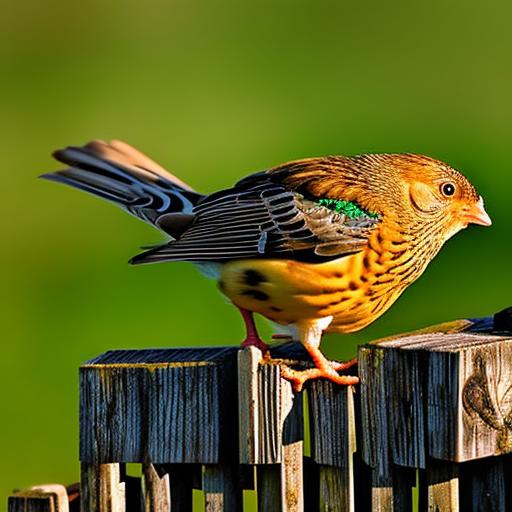Keeping chickens safe and secure is of utmost importance for their well-being and your peace of mind. Chickens have a natural instinct to fly, which can lead to escape and danger. It is essential to understand why chickens fly and how to prevent it in order to ensure their safety.
Key Takeaways
- Keeping chickens grounded and secure is important for their safety and your peace of mind.
- Understanding why chickens fly and how to prevent it can help keep them safe.
- Choosing the right type of fencing and installing a physical barrier can prevent chickens from flying.
- Netting and wing trimming can also be effective preventative measures.
- Providing adequate space and entertainment, and regularly inspecting fencing and coops can help keep chickens safe and secure.
Understanding Why Chickens Fly and How to Prevent It
Chickens fly for various reasons, including escaping danger or roosting in high places. When chickens feel threatened or scared, they may attempt to fly away from the perceived threat. Additionally, chickens have a natural instinct to roost in high places, such as trees or rooftops. This can be problematic if they are not provided with suitable roosting options within their designated area.
Preventing flight can be achieved through various methods. One effective method is the use of fencing. By installing sturdy and tall fencing around the chicken’s designated area, you can prevent them from flying over and escaping. Another method is trimming their wings. This involves carefully trimming the primary flight feathers on one wing, which disrupts their balance and prevents them from achieving lift when attempting to fly.
Choosing the Right Type of Fencing to Keep Your Chickens Safe
When choosing fencing for your chickens, it is important to select a type that is sturdy and tall enough to prevent them from flying over. Chain link fencing is a popular option as it provides a secure barrier while still allowing visibility. Welded wire fencing is another good choice as it is durable and can withstand the scratching and pecking of chickens. Electric fencing can also be effective in keeping chickens grounded, as it delivers a mild shock when touched.
Installing a Physical Barrier to Keep Chickens from Flying
| Barrier Material | Cost | Installation Time | Effectiveness |
|---|---|---|---|
| Chicken Wire | Low | Short | Low |
| Netting | Medium | Medium | Medium |
| Plexiglass | High | Long | High |
| Metal Fencing | High | Long | High |
In addition to fencing, installing a physical barrier such as netting or covers can further prevent chickens from flying out of their designated area. Netting can be used to cover chicken runs or gardens, creating a barrier that prevents chickens from escaping. These barriers can be temporary or permanent solutions, depending on your needs and preferences.
Using Netting to Keep Chickens Grounded and Secure
Netting is an effective way to keep chickens grounded and secure. It can be used to cover chicken runs or gardens, preventing chickens from flying out. When choosing netting, it is important to select the right type to prevent entanglement or injury. Opt for netting with small enough holes that chickens cannot get their heads or bodies stuck in. Additionally, ensure that the netting is securely fastened to prevent any gaps or openings that chickens could squeeze through.
Trimming Wings as a Preventative Measure

Trimming wings is another method to prevent chickens from flying over fences or barriers. This involves carefully trimming the primary flight feathers on one wing, which disrupts their balance and prevents them from achieving lift when attempting to fly. It is important to do this correctly and safely to avoid injury to the chicken. Consult with a veterinarian or experienced poultry keeper for guidance on how to properly trim wings.
Providing Adequate Space and Entertainment to Reduce Flight Instincts
Chickens that have enough space and entertainment are less likely to try to escape. Providing perches, toys, and space to roam can reduce their flight instincts. Chickens are naturally curious and active animals, so it is important to provide them with an environment that keeps them engaged and stimulated. This will help prevent boredom and the desire to escape.
Creating a Safe and Secure Coop to Prevent Escape
The coop is the primary living space for your chickens, so it is crucial to ensure that it is secure and free from weaknesses or damage. Regularly inspect the coop for any potential escape routes, such as holes or gaps in the walls or roof. Reinforce weak areas and repair any damage promptly to prevent chickens from escaping.
Regularly Inspecting Fencing and Coop for Weaknesses and Damage
Regular inspections of the fencing and coop are essential to prevent escape and ensure the safety of your chickens. Look for weaknesses or damage in the fencing, netting, and the coop itself. Repair any issues immediately to maintain a secure environment for your chickens. Additionally, check for any signs of wear or deterioration over time and make necessary repairs or replacements.
Keeping Your Chickens Grounded and Secure for Their Safety and Your Peace of Mind
In conclusion, keeping your chickens grounded and secure is vital for their well-being and your peace of mind. Preventing flight can be achieved through various methods, including fencing, netting, trimming wings, and providing adequate space and entertainment. By understanding why chickens fly and how to prevent it, you can create a safe environment that allows your chickens to thrive while minimizing the risk of escape and danger.
If you’re looking for ways to keep your chickens from flying over the fence, check out this helpful article on Poultry Wizard: Chicken Coop Run Plans. It provides valuable insights and practical tips on designing a secure chicken coop run that will prevent your feathered friends from taking flight. With detailed plans and expert advice, you’ll be able to create a safe and contained space for your chickens to roam freely without worrying about them escaping. Don’t miss out on this essential resource for chicken owners!
FAQs
What are the reasons for keeping chickens from flying over the fence?
Chickens that fly over the fence can cause damage to neighboring properties, get lost, or become prey to predators.
What are the common breeds of chickens that can fly over the fence?
Bantam breeds such as Silkies, Sebrights, and Old English Game are known for their ability to fly over fences.
What are the ways to keep chickens from flying over the fence?
Trimming their wings, installing netting or fencing, and providing enough space for them to roam are some of the ways to keep chickens from flying over the fence.
How do you trim a chicken’s wings?
Trimming a chicken’s wings involves clipping the primary feathers on one wing. This will make the chicken unbalanced and unable to fly over the fence.
What type of netting or fencing is best for keeping chickens from flying over the fence?
Hardware cloth or chicken wire with small openings are effective in keeping chickens from flying over the fence. Electric fencing can also be used as a deterrent.
What is the ideal amount of space for chickens to roam?
Chickens need at least 4 square feet of space per bird in their coop and 10 square feet of space per bird in their run to prevent them from feeling cramped and attempting to fly over the fence.
Meet Walter, the feathered-friend fanatic of Florida! Nestled in the sunshine state, Walter struts through life with his feathered companions, clucking his way to happiness. With a coop that’s fancier than a five-star hotel, he’s the Don Juan of the chicken world. When he’s not teaching his hens to do the cha-cha, you’ll find him in a heated debate with his prized rooster, Sir Clucks-a-Lot. Walter’s poultry passion is no yolk; he’s the sunny-side-up guy you never knew you needed in your flock of friends!







